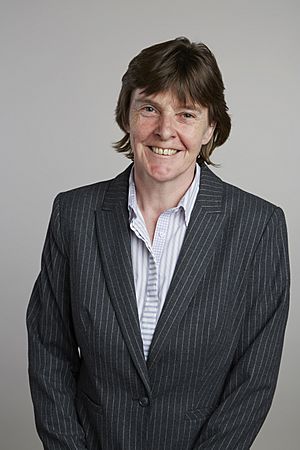Alison Etheridge facts for kids
Quick facts for kids
Dame Alison Etheridge
|
|
|---|---|

Alison Etheridge at the Royal Society admissions day in 2015
|
|
| Born |
Alison Mary Etheridge
27 April 1964 |
| Citizenship | British |
| Education | Smestow Comprehensive School |
| Alma mater | University of Oxford (MA, DPhil) |
| Spouse(s) |
Lionel Mason
(m. 1997) |
| Awards |
|
| Scientific career | |
| Fields |
|
| Institutions |
|
| Thesis | Asymptotic Behaviour of Some Measure-Valued Diffusions (1989) |
| Doctoral advisor | David Albert Edwards |
Dame Alison Mary Etheridge, born in 1964, is a brilliant mathematician. She is a Professor of Probability at the University of Oxford. She also used to lead the Department of Statistics there. She is a fellow at Magdalen College, Oxford, which is a special position.
Becoming a Mathematician
Early Schooling and University
Alison Etheridge went to Smestow School when she was younger. She loved mathematics and decided to study it at New College, Oxford. She earned her first degree in 1985. She then continued her studies for a master's degree.
Advanced Studies and Research
From 1986 to 1987, Alison traveled to McGill University in Canada. She received support from the Canadian Rhodes Scholars Foundation for this trip. After her time in Canada, she returned to Oxford. She became a special fellow and tutor for women at New College. In 1989, she completed her doctorate degree, called a DPhil, after doing research with her supervisor, David Albert Edwards.
Her Amazing Career and Research
Early Career Steps
After finishing her PhD, Alison Etheridge worked at several famous universities. She held research positions at Oxford and Cambridge. She also worked at the University of California, Berkeley, the University of Edinburgh, and Queen Mary University of London. In 1997, she returned to Oxford.
Exploring Different Math Problems
Throughout her career, Alison has explored many different math problems. Some of her work is about very abstract mathematical ideas. Other parts of her research focus on real-world uses for math. She has written four books that show this wide range of interests.
One of her books is about special mathematical objects called superprocesses. Another book, which she wrote with Mark H. A. Davis, looks at how ideas from a very old math paper (from 1900) are still used in modern financial math today.
Math and Living Things
Much of Alison's recent research is about mathematical models for population genetics. This field studies how genes change in groups of living things over time. She has worked hard to understand how the way populations are spread out in space affects their genetic differences.
Her work helps us understand how genetics and ecology (the study of how living things interact with their environment) are connected. She has created new ways to model biological populations. This helps scientists study how genes spread and change in different environments.
Leadership in Mathematics
Alison Etheridge was the head of the Department of Statistics at the University of Oxford. She held this important role for three years, until August 2022. She also led a group that reviewed mathematical sciences research in 2021.
Awards and Special Recognitions
Becoming a Fellow of the Royal Society
In 2015, Alison Etheridge was chosen as a Fellow of the Royal Society (FRS). This is a very high honor for scientists in the UK. In 2016, she also became a Fellow of the Institute of Mathematical Statistics. They recognized her for her "outstanding research" and her "international leadership" in the field.
Other Important Awards
In 2017, she was elected as the president of the Institute of Mathematical Statistics for one year. The London Mathematical Society also gave her the Senior Anne Bennett Prize in 2017.
She received another special honor in 2017. She was appointed an Officer of the Order of the British Empire (OBE) for her contributions to science. In 2018/19, the University of Edinburgh gave her an honorary Doctor of Science degree.
Serving the Scientific Community
Alison has also served on important committees. She was part of the Engineering and Physical Sciences Research Council (EPSRC)'s advisory groups. In 2018, she joined the Council of the EPSRC.
She is a Trustee of the Royal Society and a member of its governing council. In September 2021, she became the chair of the Council for the Mathematical Sciences. In 2023, she was elected to the American Academy of Arts and Sciences and the National Academy of Sciences in the United States. These are all very prestigious recognitions of her work.
 | Sharif Bey |
 | Hale Woodruff |
 | Richmond Barthé |
 | Purvis Young |

